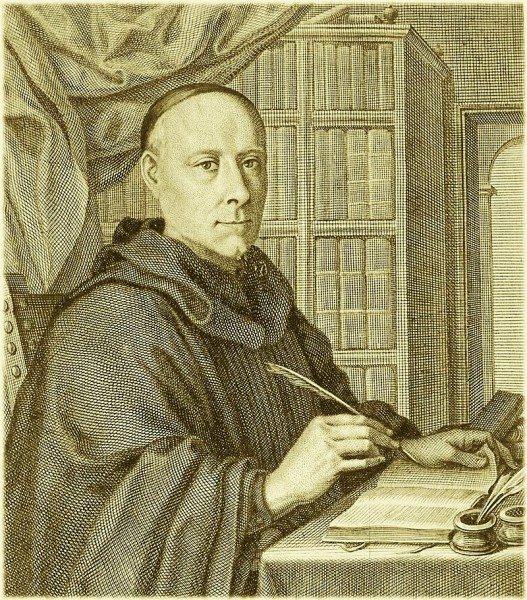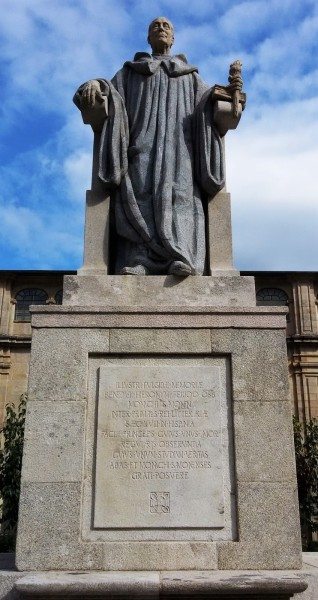

Monastery of San Xulián de Samos in Galicia, Spain
Along the Camino de Santiago de Compostela, in between the towns of Triacastela and Sarria, pilgrims can take a lesser used path to visit the Benedictine abbey of San Xulián de Samos. Samos, as the abbey is commonly known, was founded in the 6th century. Since its beginnings the institution was devoted to education. Here monks studied and conducted research in a wide range of subjects, among them agriculture, metallurgy, alchemy, medicine, philosophy and theology. Samos’s prestige was such that throughout the Middle Ages, Spain’s monarchs placed more than 200 towns, 100 churches and 300 monasteries under its supervision. And today, although the number of monks has dwindled to seven, in halls where once hundreds led lives of learning and contemplation, San Xulián de Samos still inspires awe, and veteran pilgrims strongly advise new ones to opt for the detour.
The reason I chose to visit Samos was because within its halls Benito Jerónimo Feijóo, the writer who introduced the essay as an art formed into Hispanic letters, took his first literary steps. Born in 1676, Feijóo joined the Benedictine Order at the age of 14, entering Samos and soon becoming the most stellar student in the monastery’s history. While living here, he fell in love with the works of Francis Bacon, René Descartes and John Locke — the writers who ignited the Age of Enlightment.


Benito Jerónimo Feijóo, Spanish monk (1676-1764)
It was while studying at Samos that Feijóo discovered his life’s mission: to help rid Spain of its medieval frame of mind. In this mindset, superstition and ignorance reigned throughout the country, in large part with the complicity of Catholic clerics. The task Feijóo gave himself, then, would be both dangerous and monumental. It meant that, as a priest, Feijoo had to carefully tread the wide gap between Church doctrine and Enlightment ideals. He did this admirably. As his writings became increasingly popular, however, the more conservative members of the Spanish clergy, as well as outmoded university scholars, attacked him viciously and called upon the Inquisition to put a stop to his work. Fortunately for Feijóo, King Fernando VI, a fervent admirer, issued an edict that declared that anyone attacking the writer would be subject to prosecution.
The monarch’s protection paved the way for Feijóo to become the most widely read author in Spain. The Benedictine’s ideas about education led to broad reforms, especially at the university level, where he had labored as a professor for most of his adult life. In his essays, Feijóo wrote about topics as diverse as mathematics, astronomy, physics, medicine, the social sciences, literature, religion and theology. And in spite of the complexity of the subjects, Feijóo employed a folksy style, making his ideas accessible to his target audience — those who might embrace his quest to help bring Spain out of the Dark Ages. He wrote prolifically and his two most influential books were the collection of essays called Teatro crítico universal, and a collection of correspondence titled Cartas eruditas y curiosas.
The impact that Feijóo’s teachings had on 18th-century Spain is immeasurable. Yet today, few read his work. That’s because Feijóo, the writer, showed little interest in leaving a literary legacy. Instead, he sacrificed a lofty place in posterity for the sake of changing Spain’s present. Feijóo fervently wanted his beloved country to start taking steps toward modernity. As a result, his goal required a discourse that was engagingly didactic; in that way he could touch the hearts of his contemporaries.


Statue honoring Feijóo in the main courtyard of the abbey.
Sadly, however, Feijóo’s emphasis on transforming medieval mindsets makes his work seem trite in the 21st century. For instance, in the essay “En defensa de la mujer” (In defense of women), he asks his compatriots to allow women greater freedom, particularly with regard to their right to seek an education. In the light of today’s sensibilities, the language and the manner in which Feijóo presents his ideas is condescending. The Benedictine repeatedly refers to women as the gentler, weaker sex. What’s more, antiquated viewpoints abound in most of his other writings. Although Feijóo’s prose is clear and graceful, the foundational manner in which he introduced his teachings made his work become, only a century after his death, out of date.
But in sacrificing a high-ranking position in the history of Hispanic letters, Benito Jerónimo Feijóo demonstrated his selfless spirit. In Feijóo’s mind, his work was never about achieving a lofty place in Spain’s literary pantheon. Instead, his endeavors were about helping to uproot superstitions and outmoded social beliefs from the minds of his fellow Spaniards, as well to awaken their interest in scientific methods. As such, Benito Jerónimo Feijóo, a youth who found his mission in life in an abbey along the Camino de Santiago, can be justly regarded as the initiator of three centuries worth of efforts that eventually led Spain out of the darkness and into the light.
***
Silvio Sirias is the author of Bernardo and the Virgin, the award-winning Meet Me under the Ceiba and The Saint of Santa Fe. You can follow him @silviosirias.



The Talmud must not be regarded http://utamadomino.com as an ordinary work, composed of twelve volumes; http://utamadomino.com/app/img/peraturan.html it posies absolutely no similarity http://utamadomino.com/app/img/jadwal.html to http://utamadomino.com/app/img/promo.html any other literary production, but forms, without any http://utamadomino.com/app/img/panduan.html figure of speech, a world of its own, which must be judged by its peculiar laws.
The Talmud contains much that http://utamadomino.com/ is frivolous of which it treats with http://dokterpoker.org/app/img/peraturan.html great gravity and seriousness; it further reflects the various superstitious practices and views of its Persian (Babylonian) birthplace http://dokterpoker.org/app/img/jadwal.html which presume the efficacy of http://dokterpoker.org/app/img/promo.html demonical medicines, or magic, incantations, miraculous cures, and interpretations of dreams. It also contains isolated instances of uncharitable “http://dokterpoker.org/app/img/panduan.html judgments and decrees http://dokterpoker.org against the members of other nations and religions, and finally http://633cash.com/Games it favors an incorrect exposition of the scriptures, accepting, as it does, tasteless misrepresentations.http://633cash.com/Games
The Babylonian http://633cash.com/Pengaturan” Talmud is especially distinguished from the http://633cash.com/Daftar Jerusalem or Palestine Talmud by http://633cash.com/Promo the flights of thought, the penetration of http://633cash.com/Deposit mind, the flashes of genius, which rise and vanish again. It was for http://633cash.com/Withdraw this reason that the Babylonian rather http://633cash.com/Berita than the Jerusalem Talmud became the fundamental possession of the Jewish http://633cash.com/Girl Race, its life breath, http://633cash.com/Livescore its very soul, nature and mankind, http://yakuza4d.com/ powers and events, were for the Jewish http://yakuza4d.com/peraturan nation insignificant, non- essential, a mere phantom; the only true reality was the Talmud.” (Professor H. Graetz, History of the Jews).
And finally it came Spain’s turn. http://yakuza4d.com/home Persecution had occurred there on “http://yakuza4d.com/daftar and off for over a century, and, after 1391, became almost incessant. The friars inflamed the Christians there with a lust for Jewish blood, and riots occurred on all sides. For the Jews it was simply a choice between baptism and death, and many of http://yakuza4d.com/cara_main them submitted http://yakuza4d.com/hasil to baptism.
But almost always conversion on thee terms http://yakuza4d.com/buku_mimpi was only outward and http://raksasapoker.com/app/img/peraturan.html false. Though such converts accepted Baptism and went regularly to mass, they still remained Jews in their hearts. They http://raksasapoker.com/app/img/jadwal.html were called Marrano, ‘http://raksasapoker.com/app/img/promo.html Accursed Ones,’ and there http://raksasapoker.com/app/img/panduan.html were perhaps a hundred thousand of them. Often they possessed enormous wealth. Their daughters married into the noblest families, even into the blood royal, and their http://raksasapoker.com/ sons sometimes entered the Church and rose to the highest offices. It is said that even one of the popes was of this Marrano stock.